Safest Countries In The World
Categories: Culture | Europe | Lifestyle | Nature | People | Photo project | Society | Travel | World
By Vika https://pictolic.com/article/safest-countries-in-the-world.htmlSafety is not a mere luxury or a chance result of geographical advantage. It is a critical asset that attracts investment and economic gain. However, safety is not a cultural monopoly nor a geographical dividend. No culture or region is inherently 'unstable.' The safety or danger within a nation's borders is the complex result of intricate factors and histories. However, to assess is another matter; and to do that, the Global Peace Index (GPI) produces yearly rankings that judge each country in a standardized format.
Essentially, the Institute for Economics and Peaces produces the GPI, which measures worldwide peace using three overarching categories: the state of societal safety and security; the scope of internal or international disputes; and the level of military involvement. By compiling this data, the GPI provides a comprehensive analysis of the safety of 163 countries worldwide. For reference, the lower the score, the safer the country. However, it is worth noting that exceptions can occur in these annual rankings due to temporary causes of instability.
5 PHOTOS
5 Safest Countries
- Iceland - 1.107
- New Zealand - 1.269
- Ireland - 1.288
- Denmark - 1.296
- Austria - 1.3
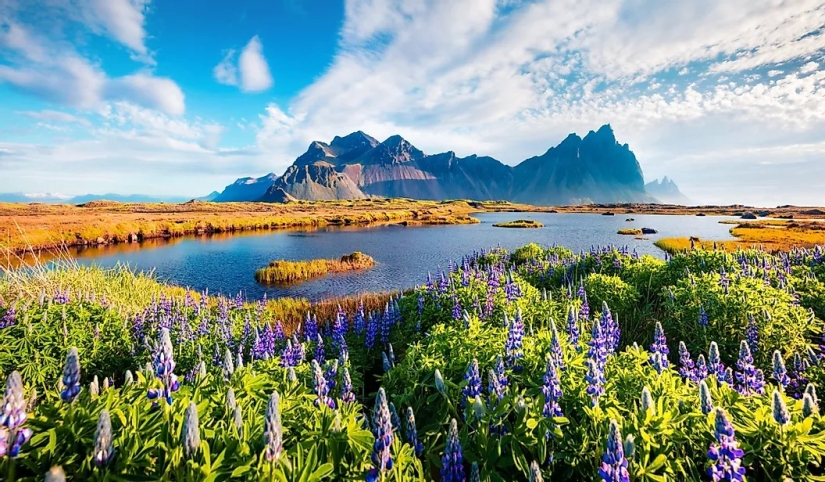
1. Iceland - 1.107
Iceland with the field of blooming lupine flowers. Image credit Andrew Mayovskyy via Shutterstock.
Iceland's status as the world's safest country is attributable to several key factors that collectively create an environment of security and tranquility. To begin with, Iceland boasts a low population of about 394,500 inhabitants, allowing for a close-knit society where community ties are strong. This engenders a sense of belonging and mutual care, reducing the likelihood of conflicts and violent crime.
Secondly, Iceland's political landscape is defined by a high degree of stability, transparency, and democratic governance. The corruption perception index consistently ranks Iceland among the least corrupt nations (#14 in 2023). The strong emphasis on the rule of law, coupled with a well-functioning government, fosters a sense of trust among the citizens and reduces instances of civil unrest or political violence.
Thirdly, the island nation benefits from a remarkably low crime rate. The homicide rate in Iceland is one of the lowest globally, with less than one murder per year on average. The country's proactive, community-focused policing, together with effective judicial processes, contribute significantly to this.
Iceland enjoys a high standard of living, with its citizens benefiting from comprehensive social security, universal healthcare, and free education. These factors help mitigate social inequalities, which can often be sources of tension and violence. In addition, the unemployment rate is relatively low, further contributing to social stability.
Lastly, the country's geographical isolation plays a role in its safety. Iceland's remote location, surrounded by the North Atlantic and Arctic Oceans, limits exposure to external threats and conflicts. In a way, it is a fortress of company, rather than solitude.
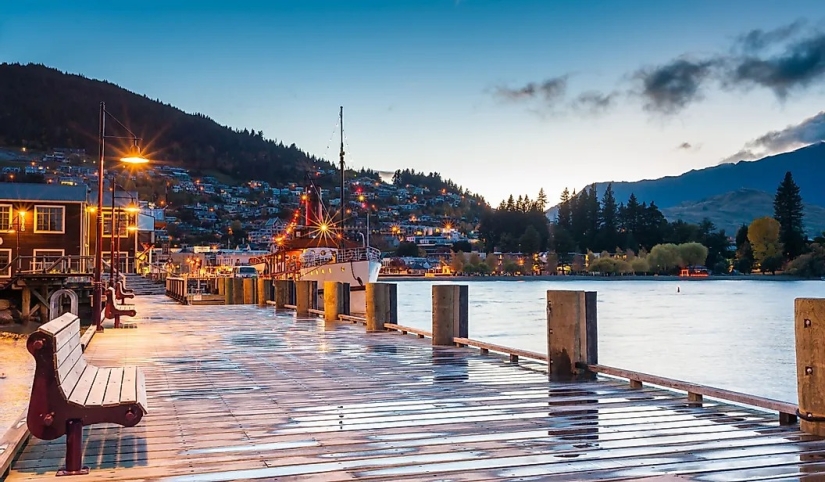
2. New Zealand - 1.269
Lake Wakatipu, Queenstown, New Zealand. Image credit sky earth via Shutterstock.
Political stability in New Zealand stems from its mature democratic system, with low levels of corruption, as reflected in Transparency International's Corruption Perception Index, where New Zealand regularly tops the list. The system fosters open dialogue, encourages citizen participation, and like Iceland, upholds the rule of law.
Moreover, the country's low crime rate is notable, with homicide rates significantly lower than the global average. New Zealand's approach to public safety focuses on preventative measures, comprehensive rehabilitation, and a justice system that values restorative practices over punitive ones.
The social fabric of New Zealand is characterized by strong levels of societal trust and cohesion, further bolstered by inclusive social policies and the government's commitment to maintaining good social services. It stands as a leading nation in terms of gender equality, further demonstrating societal harmony.
In terms of external peace, New Zealand's isolation and neutrality contribute to its safety. It maintains a non-aggressive foreign policy and does not participate in major global conflicts. Furthermore, the nation's well-functioning government is highly capable of managing potential internal and external threats, by maintaining robust disaster response protocols. The country's strong education system, access to healthcare, and the general well-being of its citizens, all recognized by high Human Development Index rankings, underline the comprehensive approach to safety that sets New Zealand apart.
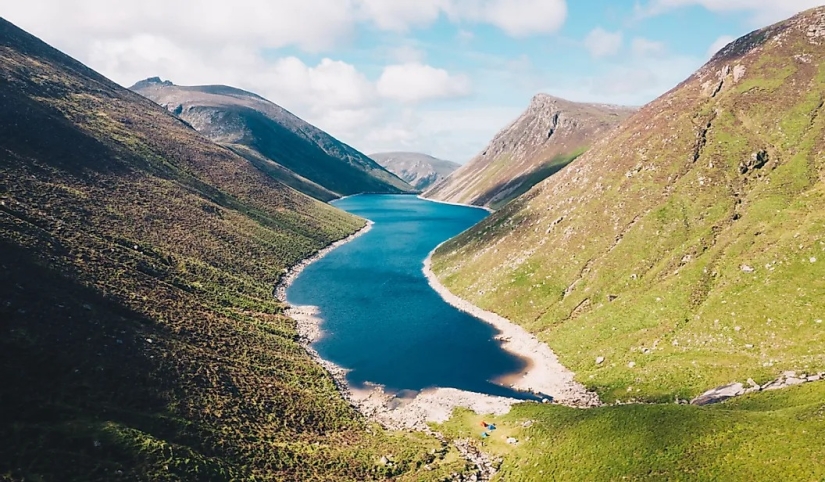
3. Ireland - 1.288
Silent Valley reservoir in Northern Ireland. Image credit 4H4 PH via Shutterstock.
Firstly, Ireland's laudable low crime rates, particularly violent crimes, continually assure its citizens and visitors that they are in good hands. For instance, the nation's homicide rate is estimated at less than 1 per 100,000 people annually, significantly below the global average. Moreover, Ireland's stringent gun control laws, yield a firearm possession rate of approximately 5.6 per 100 residents, which contributes significantly to its peaceful atmosphere.
Secondly, Ireland's political stability is another crucial factor. Its Corruption Perception Index, falling below 20, is a testament to its clean, functioning, and stable political system, strengthening societal peace. Additionally, Ireland's Human Rights Index score is also high, reflecting its strong commitment to upholding civil liberties.
Lastly, the country's positive relationships with other nations further bolster its ranking. According to the Global Terrorism Index, Ireland has an impressively low score, indicating an almost non-existent risk of international or domestic terrorism. Similarly, its involvement in international conflicts is extremely minimal.
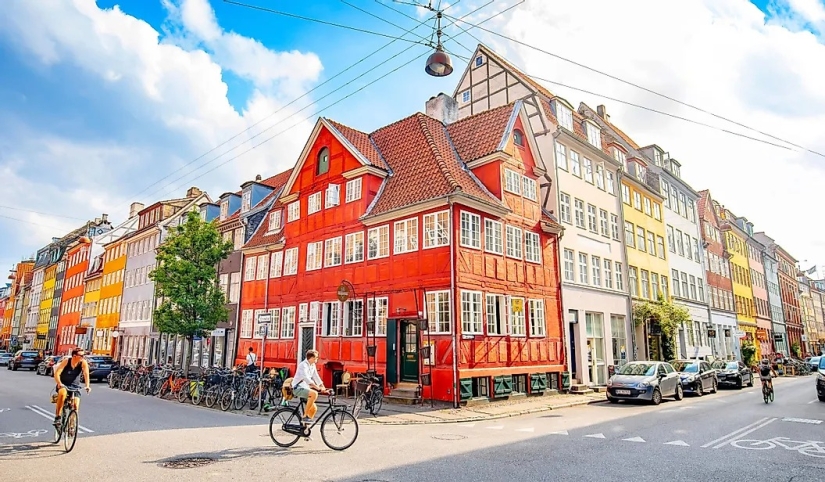
4. Denmark - 1.296
Copenhagen houses and cyclists. Image credit Arcady via Shutterstock.
Denmark's penchant for safety is thanks to a handful of factors. Low violent crime rates and an advanced justice system contribute significantly; as of 2023, Denmark had a low homicide rate of 0.95 per 100,000 inhabitants. The country's small population size (approximately 5.98 million) lends itself to less social and economic friction. A well-developed welfare state ensures comprehensive social security, bolstered by one of the world's highest GDP per capita figures (over $66,000 in 2022).
Furthermore, peaceful relations with neighboring countries decrease Denmark's risk of interstate conflicts, while limited involvement in global military operations translates into a low militarization score. Notably, the nation also invests significantly in education and healthcare, ranking 2nd globally in social progress in 2022, which invariably influences societal stability. Lastly, high levels of societal trust, reflected by the 2023 World Happiness Report, where Denmark placed 2nd, further underscores its peaceful status.
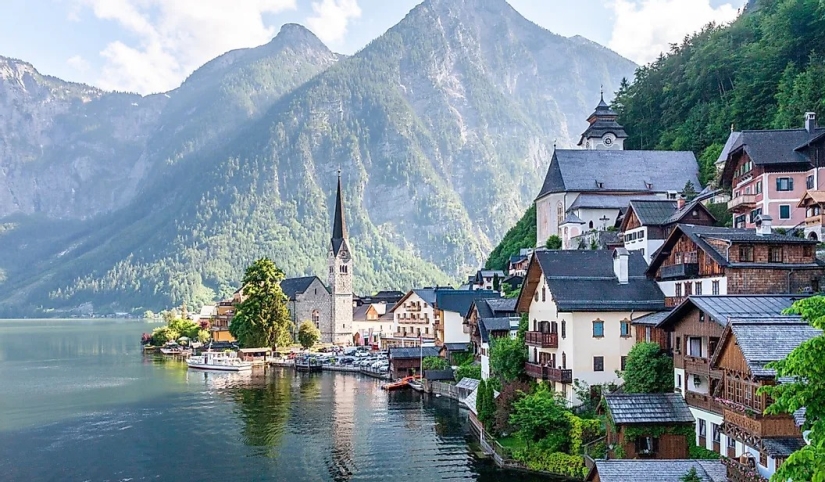
5. Austria - 1.3
The lakeside village of Hallstatt, Austria. Image credit Wirestock Creators via Shutterstock.
As a member of the European Union, Austria also benefits from regional peace and security mechanisms. The Austrian government's continued emphasis on political stability and democratic governance further contributes, with Freedom House scoring Austria 93/100 for political rights and civil liberties in 2022. Lastly, military expenditure as a percentage of GDP remains minimal, 0.7% in 2022, in line with Austria's longstanding commitment to non-aggression. Crime rates in Austria, particularly violent crime, are considerably low. In 2022, Austria reported a homicide rate of 0.7 per 100,000 people. Regarding economic strength, it boasts a stable GDP and low unemployment rate, which as of the last quarter of 2022 stood at 7.1%. Ultimately, the cumulative result of these attributes ensures Austria's consistent presence amongst the top 10 safest countries globally.
Temporary Instability In Nations That Are Typically Safe
Safety perceptions of countries like Syria and Ukraine are often skewed by temporary instabilities, obscuring their inherent security conditions. The volatility of geopolitical conditions often triggers this distortion. Recent conflicts may enhance international scrutiny and media coverage, leading to perceptions of chronic instability, despite these being transient phases in a nation's history.
For instance, Syria's safety score in 2023 might be lower because of the civil war that lasted a decade and began to wane around 2022. However, before the conflict, Syria had a higher safety score due to factors such as effective law enforcement, social stability, and a low crime rate. The same applies to Ukraine, which experienced a dip in safety scores following the 2014 annexation of Crimea but had a traditionally stable sense of security beforehand.
Post-conflict, countries usually return to their pre-crisis safety levels, as seen with London after WWII. Hence, conflating temporary instability with a nation's overall safety is a common misconception. Future safety predictions should account for a nation's historical stability, institutional resilience, and capacity for post-conflict reconstruction.
Conclusion
As illustrated through examples like Iceland and Ireland, security and peace are products of diverse factors, ranging from political stability, low crime rates, social cohesion, economic prosperity, and even geographical isolation. Furthermore, the notion of safety is dynamic, subject to alterations by ongoing geopolitical tensions, as the cases of Syria and Ukraine show. Therefore, while assessing a nation's safety, it is imperative not to isolate its present circumstances, but to comprehend broader trends in its historical context. However, by setting a high standard, many of these countries prove to the rest of the world that high stability and security are not the fictitious dreams of utopian novelists, but achievable realities here and now.
Keywords: Safest Countries | World | Traveling | Countries | Geographical advantage | Cultural monopoly | Life safety | Nations
Post News ArticleRecent articles

It's high time to admit that this whole hipster idea has gone too far. The concept has become so popular that even restaurants have ...

There is a perception that people only use 10% of their brain potential. But the heroes of our review, apparently, found a way to ...
Related articles

Have you heard of such a phenomenon as the doorway effect? Let's put it simply: have you ever walked into a room and immediately ...

Walking through this picturesque bridges, you can admire the views from these stunning views and breathtaking landscapes. We invite ...

Not all the house where they filmed the cult movies and TV shows, become "house-museums". Many of them are then sold as the ...

New Year's is a time to surprise and delight loved ones not only with gifts but also with a unique presentation of the holiday ...